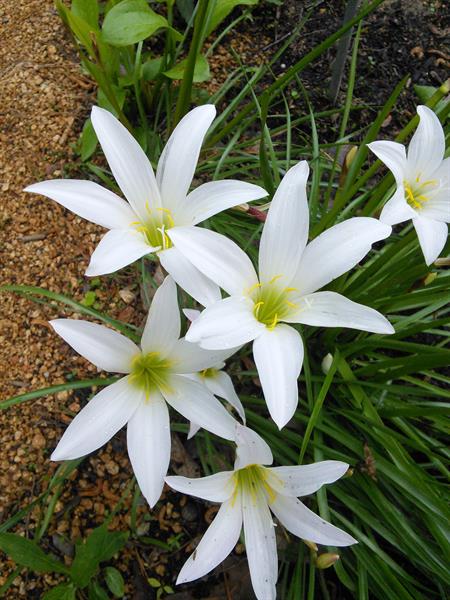
Origin/Endemic status: Endemic
Taxonomy Comments: The correct spelling of the epithet is apparently ‘atamasco’; a conservation proposal (to resolve the uncertainty) has been made and will likely be accepted.
Synonymy: = C, F, G, GW1, RAB; = Atamosco atamasco (L.) Greene – S, S13; = Hippeastrum atamasco (L.) Christenh. & Byng – Christenhusz, Fay, & Byng (2018); = n/a – Tat; = Zephyranthes atamasca (L.) Herb. – FNA26, K3, K4, Va, orthographic variant; = Zephyranthes atamasca (L.) Herb. var. atamasca – K1, WH3, orthographic variant
Wetland Indicator Status:
- Atlantic and Gulf Coastal Plain: FACW (name change)
- Eastern Mountains and Piedmont: FACW (name change)
Heliophily: 4
Hover over a shape, letter, icon, or arrow on the map for definition or see the legend.
 © Alan Cressler: zephyranthes atamasca, montezuma bluffs natural area, macon county, georgia 3 by Alan Cressler source | Original Image ⭷
© Alan Cressler: zephyranthes atamasca, montezuma bluffs natural area, macon county, georgia 3 by Alan Cressler source | Original Image ⭷ © Alan Cressler: Zephyranthes atamasca, Tributary to Four Hole Creek, Calhoun County, South Carolina 1 by Alan Cressler source | Original Image ⭷
© Alan Cressler: Zephyranthes atamasca, Tributary to Four Hole Creek, Calhoun County, South Carolina 1 by Alan Cressler source | Original Image ⭷ © Scott Ward | Original Image ⭷
© Scott Ward | Original Image ⭷ © Grant Morrow Parkins | Original Image ⭷
© Grant Morrow Parkins | Original Image ⭷ © Grant Morrow Parkins | Original Image ⭷
© Grant Morrow Parkins | Original Image ⭷ © Bruce A. Sorrie | Original Image ⭷
© Bruce A. Sorrie | Original Image ⭷ © Alan Cressler: Zephyranthes atamasco, Brown's Mount, cliffs, Bonds Swamp National Wildlife Refuge, Bibb County, Georgia 1 by Alan Cressler source | Original Image ⭷
© Alan Cressler: Zephyranthes atamasco, Brown's Mount, cliffs, Bonds Swamp National Wildlife Refuge, Bibb County, Georgia 1 by Alan Cressler source | Original Image ⭷ © Alan Cressler: Zephyranthes atamasca, Richland County, South Carolina 2 by Alan Cressler source | Original Image ⭷
© Alan Cressler: Zephyranthes atamasca, Richland County, South Carolina 2 by Alan Cressler source | Original Image ⭷ © Scott Ward, some rights reserved (CC BY), uploaded by Scott Ward source CC-BY | Original Image ⭷
© Scott Ward, some rights reserved (CC BY), uploaded by Scott Ward source CC-BY | Original Image ⭷ © Gary P. Fleming | Original Image ⭷
© Gary P. Fleming | Original Image ⭷ © Bruce Sorrie | Original Image ⭷
© Bruce Sorrie | Original Image ⭷Feedback
See something wrong or missing on about Zephyranthes atamasco? Let us know here: (Please include your name and email if at all complicated so we can clarify if needed.)
Cite as...